THE (IM)POSSIBILITY OF FORGIVENESS? An empirical intercultural Bible reading of Matthew 18:15-35
262pp., paperback, Beyers Naudé Centre on Public Theology Series, Volume XI, Stellenbosch, 2017
"The findings from this study go beyond biblical-theological scholarship on forgiveness. Dion Forster boldly succeeds in showing that creating conditions for deeper human connection transforms impossibility into possibility and shines a light on the face of 'the Other', who can now be forgiven." Pumla Gobodo-Madikizela, Professor and Research Chair of Historical Trauma and Transformation, Stellenbosch University
This book deals with contested and topical matters. Biblical hermeneutics has always been contested - how to read and understand Biblical passages. Things become even more contested when such passages are read inter-culturally; they become even more contested when the words are about contested personal and social issues, like Jesus' words on forgiveness in Matthew 18. Empirical studies like this show how deeply contested such readings truly are in the context of South African churches, with their painful histories of division and conflict. Future academic work will, therefore, benefit from the creative and careful methodological approach developed in this study. However, this book offers much more than academic promise - precisely because of the theme, so topical today and without doubt topical for a long time to come and in many other places in our contemporary world as well. Forster offers resources for reading and conversation for everyone concerned with public life today. This is public theology in action, showing how faith matters - without prescribing answers, but rather by invitation to join an informed discussion." Dirk J Smit, Rimmer and Ruth deVries Professor of Reformed Theology and Public Life, Princeton Theological Seminary
Dion Forster is Chair of the Department of Systematic Theology and Ecclesiology, Stellenbosch University, where he teaches Ethics and Public Theology. He is also the Director of the Beyers Naudé Centre for Public Theology.

